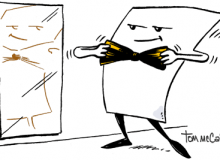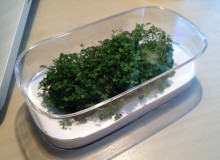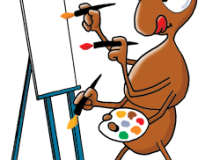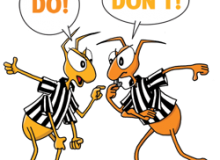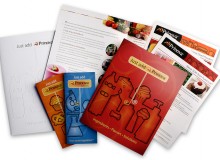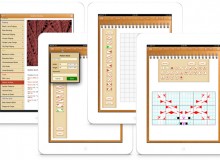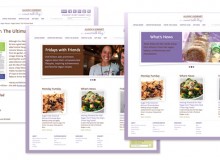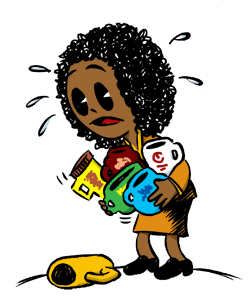 Most trade show giveaways are lame. How many cheap plastic pens does one really need anyway? And don’t even get me started about all those mismatched coffee mugs cluttering the office kitchen. Lame ideas are born of laziness rather than a meager budget or a short deadline. They don’t really support the brand and probably hurt it.
Most trade show giveaways are lame. How many cheap plastic pens does one really need anyway? And don’t even get me started about all those mismatched coffee mugs cluttering the office kitchen. Lame ideas are born of laziness rather than a meager budget or a short deadline. They don’t really support the brand and probably hurt it.
So why do we do it? I think it’s primarily because many marketers don’t equate increased value with a better promotional plan. Many don’t have the passion it takes to be unique. And some doubt their own creative abilities.
Well, let’s address these concerns by exploring the possibilities. We’ll start with understanding your target audience and your goals for the trade show, then build from there.
Get a Plan.
Consider the potential sales value of each lead and budget accordingly. If your products are inexpensive, you’re not going to want to spend a lot on swag. However, if one potential buyer could spend half a million bucks with your company, you’ve got to up the ante accordingly.
And remember, your logo on any old object won’t support your brand as much as a unique and appropriate concept.
Holding a business card drawing for a digital camera may seem like a good idea for drawing traffic to your booth, but there is a difference between traffic and prospects. Most of the people standing in line for your camera fish bowl are not your prospects. You haven’t prequalified them. To get the prospects that will reward you by becoming clients, you’ll have to work harder.
If your prospects are indeed all show attendees, your promotional goals will be different than if you’re targeting only 5% of attendees. Remember, in the right situation, a more selective approach could actually require a smaller budget and yield larger returns.
Don’t Be Cheap.
Having a meager budget and being cheap are two different things. If your budget is small, don’t be cornered into buying the shoddiest swag you find. Cheap swag will cheapen your brand and may even break, further impacting your brand’s image. Not a risk you should take.
The wiser approach with a smaller budget is to buckle down and get creative. Consider buying a smaller quantity and target it to only the most qualified of leads. Keep it out of sight until sales reps have qualified the booth visitor.
Creating Value On a Budget.
Swag doesn’t have to be expensive. With a little creativity, you too can find something that resonates with prospects, supports your brand and is memorable. Here are several approaches to staying on a tight budget.
- You can use your own product to create something unique. Ever hear of the floor covering company that created insoles for shoes from one of their highly comfortable flooring products? The preprinted insoles were cut to fit attendees shoes right in the booth. Attendees were able to review the product in action and sales persons had an opportunity to chat up the target during their fitting.
- Have a multi-tiered swag plan. Have something low-cost for the masses and have a few higher-ticket items saved for those who really qualify (after a lengthy discussion with a sales person, of course). For instance, save the iPod docking station for C-level folks while investing something of a lesser value to mid-level persons. Just make sure to keep the A-list items out of sight of the B-listers, and use discretion about handing them out in a crowd. Perhaps the high value item gets shipped to the prospect after you’ve gathered the qualification info. And don’t forget to train your booth mavens to qualify leads quickly so they don’t waste time and swag on trade show rats scavenging for a handout. This is one of the best ways to manage your swag budget. Train your folks to be selective.
- Take another look at your product samples and think about them in terms of giveaways. For instance, a printer I know who is focused on educational tools for K-12 has a large static vinyl dinosaur they printed for classroom display. This is just the kind of cool thing that a prospective buyer in their target market would think is nifty. Not only does it show the printer’s skills, but it also can actually be used in a kid’s room and is incredibly fun.
- Make it a two-parter. Keep costs down by sending part one of the giveaway with an invitation-only premailer a week prior to the show. Include only the top 50 key folks you want to invite to your booth/hotel suite party/post-show golf outing. Make it clear that they get part two when they show up. Again, this is a limited, highly targeted list; NOT everyone attending the show. This approach provides you more face time with your targets than just hoping they mosey by between sessions.
- Be everywhere. If most of the attendees are true prospects, station a greeter at the front door to the event to give away coupons for free product samples at the booth to the first 100 people. This works exceedingly well if you promote it before the event with premailers. If the limited edition samples are top shelf, folks will make it to the show early enough to snag a coupon. Just be sure to label your greeter clearly so they can be found in the crowd.
- Beware the food item (unless food is your business). Once it’s eaten, it’s gone. Using food can be much more effective if it’s part of a kit or accompanied with something more permanent. And if food is your business, coupons are much appreciated by folks after they leave the show.
Be Unique.
Tons of companies give away corporate coffee mugs, and most of them end up at Goodwill. You could be different by simply providing another use for those crappy mugs your prospects got at another booth by giving them a Mug Boss® tool organizer. This is a great example of something unique, functional and fun.
If you can’t find something unique that supports your promotional goals and fits within your budget, start looking for something with a unique design. Sometimes a uniquely designed everyday item is actually less expensive than something totally unique. But you’ll have to dig for it.
Use Swag Instead of a Booth.
Didn’t exactly nail a prime booth spot in time for the show? Not to worry. Here’s where you can really get creative. Take that budget, or even half of it, and apply it to a promotional program that includes appropriate giveaways.
See if show management will allow you to work the floor, entrance, coat check or parking lot. There’s no reason why you can’t use a unique giveaway item to introduce yourself to folks outside of a traditional booth.
- Working coat check? Provide imprinted scarves either when they check their coat or pick them up. Just make sure your logo placement is tasteful.
- Working the parking lot in the summer? Provide sunscreens for car windows. Imprinted with your marketing message of course.
- Working the entrance or main hallway? Offer a cool tote bag before they enter the show. And remember, cool doesn’t mean expensive. They can be very simple bags with a wildly creative printed design, and your logo of course.
Of course, don’t forget to strike up a conversation at the same time, provide an accompanying promo card and collect leads.
Include Swag In Your Follow Up Kit.
Have your follow up kits ready to go before the show. (You DO have follow up kits, right?) By sending in leads daily to your assistant back at the office, follow up kits can be waiting for your prospects when they return home. This also stretches your budget by allowing you to be highly selective. Another tip: if your kit is a flat mailer, include a ‘bump’ in your kit— a small item that prevents the envelope from lying perfectly flat. It can be almost anything but should relate to the contents of the kit and ideally, back to the theme you used for the show. Bumps almost guarantee your kit will be opened. Yet one more tip: include a label on the outside of the envelope stating the information was requested at the show and your kit will be more likely to get past the gatekeepers.
![]()
Build a Better List From Show Contacts. Use the opportunity to gather permission to include targets on your monthly emailed newsletter. Studies show that permission-based emails get opened 26% more often than unsolicited emails. Then follow up via email within 24 hours to let them know you’ll add them to the list and when they’ll receive the first issue. Oh, and “in the meantime, here’s a white paper you may find interesting”. Make this first contact personal, before they’re added to the newsletter subscriber list.
![]()
— by Julia Moran Martz
